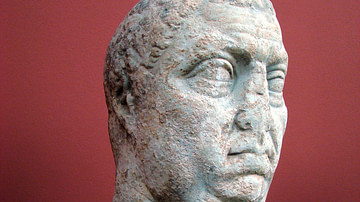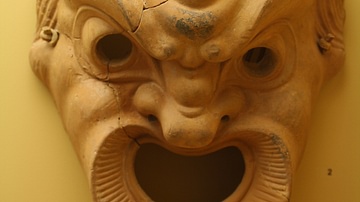Search
Search Results

Video
Ancient Roman Games, Sports and Spectacles
The people of ancient Rome loved spectacles and, lucky for them, they could often be entertained by lavish public shows. The emperors of Rome knew of their people's love of spectacle so a way that they could garner popularity and prestige...

Article
The Battle of Gaugamela, 331 BCE
After securing the eastern Mediterranean seaboard and Egypt, Alexander the Great pushed east into Mesopotamia with the intention of bringing Darius to battle. After crossing the Euphrates River unopposed, he marched his army eastward along...

Definition
Mythology
Myths are a part of every culture in the world and are used to explain natural phenomena, where a people came from and how their civilization developed, and why things happen as they do. At their most basic level, myths comfort by giving...

Definition
Belisarius
Flavius Belisarius (l. 505-565 CE) was born in Illyria (the western part of the Balkan Peninsula) to poor parents and rose to become one of the greatest generals, if not the greatest, of the Byzantine Empire. Belisarius is listed among the...

Definition
Byzantine Emperor
The Byzantine Emperor ruled as an absolute monarch in an institution which lasted from the 4th to 15th century CE. Aided by ministers, high-ranking nobility, and key church figures, the emperor (and sometimes empress) was commander-in-chief...

Definition
Silphium
Silphium (also known as laser) was an uncultivated plant that grew in Cyrene, North Africa (modern Shahhat, Libya) and became the cash crop of the region of Cyrenaica between c. 631 BCE and the 1st century CE when, according to Pliny the...

Definition
Ptolemy II Philadelphus
Ptolemy II Philadelphus ("The Sibling Loving", r. 282-246 BCE) was the second ruler of the Ptolemaic Dynasty. He consolidated the kingdom conquered by his father Ptolemy I and presided over its golden age. Ptolemy II invested heavily in Alexandria...

Definition
Alexander Severus
Alexander Severus served as the Roman emperor from 222 CE until his untimely death in 235 CE. At the urging of his mother, aunt, and grandmother, Emperor Elagabalus named his cousin Alexianus (the future Alexander Severus) as his heir in...

Definition
Vitellius
Vitellius was Roman emperor from April to December 69 CE. Vitellius was the third of the four emperors who ruled the Roman Empire in the year 69 CE. One of his predecessors, Galba, who had replaced the fallen Emperor Nero, was murdered by...

Definition
The Clouds
The Clouds is a comedy written c. 423 BCE by the Greek playwright Aristophanes (c. 448 BCE – c. 385 BCE). A failure at the Dionysia competition, finishing third out of three, it was revised later in 418 BCE but never produced in the author's...